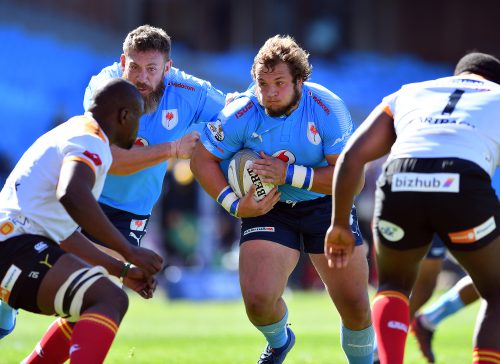Goodbye to cheating and danger in the scrums as Saru finally gives the Lions and co the green light for an extra player on the bench.

Blue Bulls coach John Mitchell says they've been merely lucky to have gotten away with such a big workload on prop Pierre Schoeman. Photo: Johan Rynners/Gallo Images.
If there’s one thing that won’t be seen in this weekend’s Currie Cup semifinals, it will be uncontested scrums.
Rugby folk can thank Rudolf Straeuli for that.
The Lions CEO personally called all his counterparts at the other unions to agree on lobbying the South African Rugby Union to allow them to use eight replacements in Saturday’s matches.
Also read: Currie Cup rules promoting danger and cheating, say coaches
Only seven players had been permitted on the bench for the duration of the tournament.
It distinctly divided opinion among coaches, with Western Province coach John Dobson prominently believing it encouraged cheating in the scrums.
“I really want to give Rudolf the credit for that,” Lions coach Swys de Bruin said on Thursday, ahead of the meeting with WP at Newlands.
“He actually felt throughout the tournament that we should’ve had an agreement on eight replacements from the outset. He contacted other chiefs and they agreed.”
The biggest benefit is that all four sides in the semifinals – the Sharks host the Blue Bulls in Durban in the other match – can now pick two props on the bench.
John Mitchell, the Bulls’ director of rugby, earlier in the campaign said his management team had accepted they needed to work around only have one replacement prop.
However, Saru’s decision to revert to match squads of 23 – which is standard practice worldwide – led him to being more candid on the issue.
“I must admit I found the arrangement of having only 22 players in the match squad strange,” said the former All Blacks coach.
“It was a weird rule in terms of development. We missed out on a huge development opportunity. We could’ve given another prop the chance of playing 35 minutes or so each week.
“It’s really good they’ve made this decision.”
Another consequence of that is the fact that team’s don’t have to overwork one of the starting props, who’d have to play the full 80 minutes.
“Teams had to ‘survive’ games with one guy playing full games the whole time. We’ve been extremely fortunate that (loosehead) Pierre Schoeman has been able to keep his intensity while playing 80 minutes every week almost. It takes its toll over time,” said Mitchell.
The risk of moving a versatile player from loosehead to tighthead (or vice versa) is also eliminated.
Most forward coaches agree that the two positions are actually specialised.
“Last year, we were caught off-guard by opponents going for uncontested scrums. It’s a positive thing,” said De Bruin.
“For me it’s always been a safety thing. We now don’t have to force a loosehead who can play tighthead to shift, even if he’s actually not all that comfortable with the switch.”
Download our app